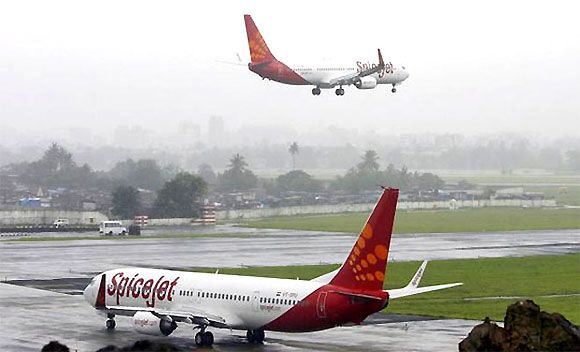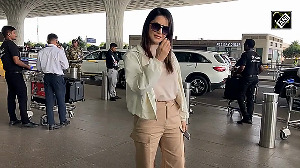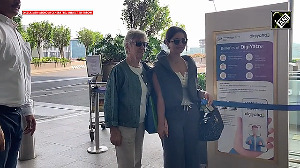 A year ago, SpiceJet was on the verge of closure.
A year ago, SpiceJet was on the verge of closure.
The airline was defaulting on payments and lessors were in a scramble to take their aircraft back. In less than 12 months, Ajay Singh (below left), co-founder and promoter of low-cost carrier SpiceJet, has brought the airline back from the brink of bankruptcy.
In an interview with Malini Bhupta and Aneesh Phadnis, Singh explains how he managed to revive the ailing airline and bring down liabilities to Rs 1,000 crore from Rs 2,200 crore a year ago. Excerpts:
How have you managed to turn around the airline in one year?
Last December, SpiceJet had cancelled a large number of flights on December 15 and 16, and there were fears of the airline shutting down.
This makes it difficult for consumers to plan and buy tickets. We had to bring back the confidence of our consumers.
We also needed to optimise the network and revenues. We focused on the revenue side a lot. Last year, the airline's on-time performance was 40 per cent and it is now 86 per cent; load factors are up to 96 per cent.
We were operating 220 flights a day last year and now we are operating 300 flights a day.
How are you keeping the team together?
I had started an employee stock option plan in the past, and we were the first airline in this part of world to start such a scheme.
We are looking to re-launch the scheme. It is incredibly important that everybody at SpiceJet not only feel they own SpiceJet, but they actually own it.
 That sense of ownership is important and I will make sure that people feel that and benefit from growth of ownership.
That sense of ownership is important and I will make sure that people feel that and benefit from growth of ownership.
We are looking at a wide sweep for that scheme and not limited to just few people.
You renegotiated contracts with partners to lower costs?
The airline had shut down and if a company goes into bankruptcy in India it is difficult to recover anything.
So I told partners that we needed to cut costs to be sustainable. We managed to renegotiate contracts.
Has the airline defaulted again and is it on cash-and-carry mode?
In January, the airline had defaulted on payment of Rs 275 crore to Airport Authority of India (AAI).
The question asked in Parliament was if SpiceJet owed money and was it on cash-and-carry? Technically, the answer is 'yes'.
What we have done is that we will be paying AAI on a daily basis and we pay something extra for past liability. From Rs 275 crore, the outstanding to AAI is now at Rs 150 crore.
What is the equity you have invested from the committed Rs 1,500 crore?
At the time we took over, we thought that the airline would need Rs 1,500 crore. It was an estimated figure.
The airline has done a lot better than we had anticipated and so we did not need so much money. We invested Rs 800 crore.
We have brought down liabilities from Rs 2,200 crore to Rs 1,000 crore at present. We are in a very comfortable situation from a cash generation point of view.
We do not need any more money for operations.
The airline's net worth is negative, despite the airline turning profitable. Will you look at fund infusion in the coming months?
The net worth has been negative for the longest time. But the airline is profitable and you will see significant progress in the coming months.
We are looking at some options and we are looking at settling some past liabilities and these negotiations are on but they do not have any impact on operations.
What settlements are these?
Some of these settlements are to do with engineering services and they are under negotiations. None of these are impacting operations.
Are you looking at strategic investors or financial investors?
We have been approached by both foreign institutional investors and strategic investors.
But at this point of time, we do not feel we need to dilute at these valuations.
There is such a big gap between Indigo's valuation and SpiceJet's that I feel some of the gap can be closed. From an operating point of view, the airline is generating sufficient cash.
When we look at new orders, we will look at options.
SpiceJet's unit costs and unit revenue trail those of IndiGo's. In the near term, how do you plan to bridge the gap in these metrics?
We are looking at reducing the cost of aircraft lease rentals.
Each time a new aircraft model is launched or becomes available in the market (like Boeing 737Max or A320Neo), the price of old models fall and we are looking at those opportunities to reduce leasing costs.
We are working with all vendors to bring down maintenance costs. We have succeeded to quite an extent especially with the Bombardier Q400 aircraft.
Cost reduction and unit cost reduction are (like) a religion and need to be done on a daily basis and we continue to do it.
I think part of the problem with SpiceJet is that consciousness had got lost along the way. Unit revenue is up this year despite the fall in fares, which is really incredible.
Corporate business had come to complete zero last year. It has picked up tremendously.
Your routes got pruned last year. How are you planning to get back on the map?
What had happened was that the lessors were taking the aircraft back and flights were pruned in a haphazard way.
Twenty aircraft were repossessed last year. We have done significant capacity addition in the last few months with six aircraft being added in October alone.
One of the concerns the market has is that the airline is operating a large part of its fleet on wet leases.
A wet lease allows me to be flexible and expand capacity in the short run as the aircraft comes with crew and engineering support.
Also, the seasonality is so different for India compared to other European countries that we can get cheaper leases.
What kind of additions are you looking at in the coming years?
We have floated RFPs (request for proposal) and we have got responses from both Boeing and Airbus.
I hope to finalise the large aircraft order in FY16. We would like to add 15 aircraft a year from 2018 and we think we can easily do that.











 © 2025
© 2025